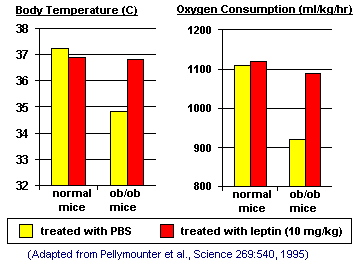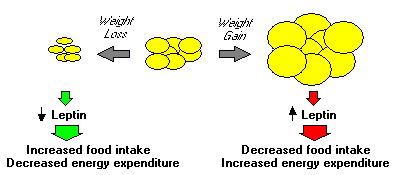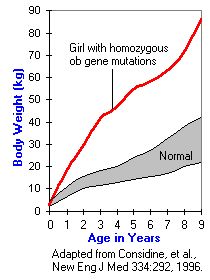VIVO Pathophysiology
Leptin
Leptin (from the Greek leptos, meaning thin) is a protein hormone with important effects in regulating body weight, metabolism and reproductive function. The protein is approximately ~16 kDa in mass and encoded by the obese (ob) gene.
Leptin is expressed predominantly by adipocytes, which fits with the idea that body weight is sensed as the total mass of fat in the body. Smaller amounts of leptin are also secreted by cells in the epithelium of the stomach and in the placenta. Leptin receptors are highly expressed in areas of the hypothalamus known to be important in regulating body weight, as well as in T lymphocytes and vascular endothelial cells.
Physiologic Effects of Leptin
Regulation of Food Intake, Energy Expenditure and Body Weight
Leptin in an important component in the long term regulation of body weight. Genetically obese mice with inactivating mutations in the ob gene or the gene encoding the leptin receptor (db gene) have been known for many years and were instrumental in the initial cloning of the ob gene. Recent studies with obese and non-obese humans demonstrated a strong positive correlation of serum leptin concentrations with percentage of body fat, and also that there was a higher concentration of ob mRNA in fat from obese compared to thin subjects. It appears that as adipocytes increase in size due to accumulation of triglyceride, they synthesize more and more leptin. In essence, leptin provides the body with an index of nutritional status.
Leptin's effects on body weight are mediated through effects on hypothalamic centers that control feeding behavior and hunger, body temperature and energy expenditure. Soon after cloning the ob gene, its cDNA was expressed as protein in E. coli and preliminary assessment of its effects undertaken. Daily injections of recombinant mouse or human leptin into ob/ob mice (the obese mutants unable to synthesize leptin) led to a dramatic reduction in food intake within a few days, and to roughly a 50% reduction in body weight within a month. As depicted in the graph below, weight loss resulting from administration of leptin appears to result from a combination of at least two fundamental effects:
- Decreased hunger and food consumption, mediated at least in part by inhibition of neuropeptide Y synthesis. Neuropeptide Y is a very potent stimulator of feeding behavior.
- Increased energy expenditure, measured as increased oxygen consumption, higher body temperature and loss of adipose tissue mass.

As expected, injections of leptin into db/db mice, which lack the leptin receptor, had no effect.
The mechanisms by which leptin exerts its effects on metabolism are largely unknown and clearly quite complex. In contrast to dieting, which results in loss of both fat and lean mass, treatment with leptin promotes lipolysis in adipose tissue, but has no apparent effect on lean tissue.
Reproductive Function
It has long been known that starvation adversely affect reproductive function. For example, very low body fat in human females is often associated with cessation of menstrual cycles, and similar effects are seen in starving or nutritionally-deprived animals. Also, the onset of puberty is known to correlate with body condition as well as age.
Leptin concentrations are low in people and animals with low body fat, and leptin appears to be a significant regulator of reproductive function. These effects are probably due in part to the ability of leptin to enhance secretion of gonadotropin-releasing hormone from the hypothalamus, and thus luteinizing and follicle-stimulating hormones from the anterior pituitary.
One of the first demonstrations of leptin's effect on reproduction dealt with onset of puberty. Prepubertal mice treated with leptin became thin, as one would expect, but also reached reproductive maturity and began cycling significantly earlier than control mice. Additionally, some humans with inactivating mutations in the leptin receptor gene not only are obese, but fail to achieve puberty.
Control of Leptin Synthesis and Secretion
The amount of leptin expressed by adipocytes correlates well with the lipid content of the cells. Once synthesized, leptin is secreted through a constitutive pathway and not stored in the cell.

At this time, the mechanisms responsible for regulating leptin expression in adipocytes are unknown. It is likely that a number of hormones modulate ob gene expression, including glucocorticoids and insulin.
Disease States
 Mice with inactivating mutations in the gene encoding leptin or its receptor have indistinguishable, recessive phenotypes of obesity, with roughly three times the body weight and five times the fat mass of normal mice. They also manifest diabetes, and show cold intolerance, depressed immune function and infertility.
Mice with inactivating mutations in the gene encoding leptin or its receptor have indistinguishable, recessive phenotypes of obesity, with roughly three times the body weight and five times the fat mass of normal mice. They also manifest diabetes, and show cold intolerance, depressed immune function and infertility.
Mutations in ob or db genes appear to be a very rare cause of morbid obesity in humans, but both have been described. Some ob mutations lead to synthesis of abnormal forms of leptin that function as antagonists and thereby interfere with leptin therapy. The effect of such mutations on body weight is dramatic. The figure to the right depicts the growth curve for a young girl found to have homozygous inactivating mutations of the ob gene, contrasted to normal children (2nd to 98th percentiles).
One other disease associated with leptin deficiency is lipodystropy, a condition with multiple causes that is characterized by loss of adipose tissue.
Importantly, blood concentrations of leptin are elevated in a majority of obese humans, especially those with diet-induced obesity. Moreover, treatment of such individuals with leptin is not effective in reducing obesity, which makes sense because they already have high levels of endogenous leptin. High blood levels of leptin in the face of obesity indicates what is called leptin resistance. The mechanisms for such resistance are poorly understood and likely involve multiple defects in leptin signal transduction within the central nervous system.
Is leptin useful for treating human obesity? In those rare cases where leptin is actually deficient due to mutations in the ob gene, leptin treatment is effective and life preserving. Leptin is also useful for treating some patients with lipodystrophy. However, as described above, a large majority of obese humans already have high circulating concentrations of leptin, and leptin therapy is ineffective. Be skeptical about the numerous products that claim to be useful for treating obesity because they contain leptin.
References and Reviews
- Clement K, Vaisse C, Lahlou N, et al: A mutation in the human leptin receptor gene causes obesity and pituitary dysfunction. Nature 392:398, 1998.
- Considine RV, Sinha MK, Heiman ML etc: Serum immunoreactive-leptin concentrations in normal-weight and obese humans. New Eng J Med 334:292, 1996.
- Friedman JM, Halaas JL: Leptin and the regulation of body weight in mammals. Nature 395:763, 1998.
- Friedman J. The long road to leptin. J Clin Invest. 2016; 126:4727-4734.
- Funcke J-B, Moepps B, Roos J, von Schnurbein J, Verstraete K, etc. Rare Antagonistic Leptin Variants and Severe, Early-Onset Obesity. New Eng J Med 388:2253-2261, 2023.
- Montague CT, Faroozi IS, Whitehead JP, etc: Congenital leptin deficiency is associated with severe early-onset obesity in humans. Nature 387:903, 1997.
- Pan WW, Myers MG. Leptin and the maintenance of elevated body weight. Nature Rev Neurosci. 2018; 19:95-105.
- Pelleymounter MA, Cullen MJ, Baker MB, etc: Effects of the obese gene product on body weight regulation in ob/ob mice. Science 269:540, 1995.
Updated July 2023. Send comments to Richard.Bowen@colostate.edu
